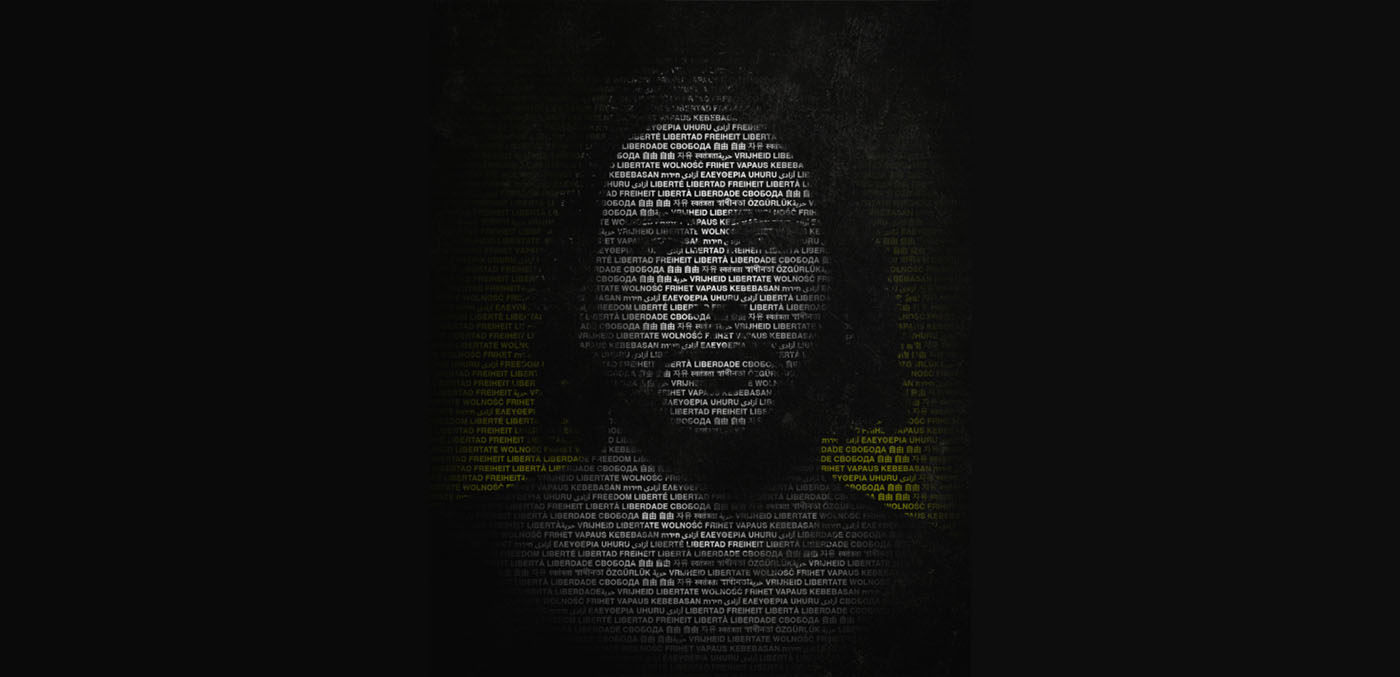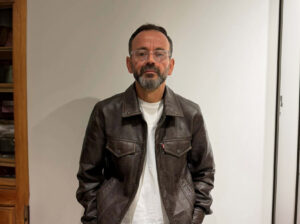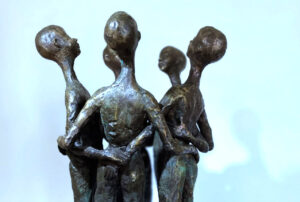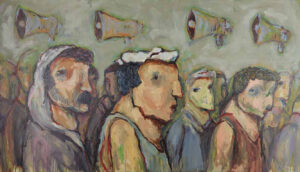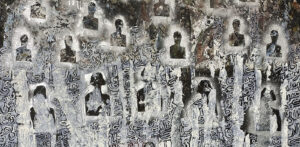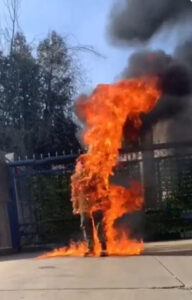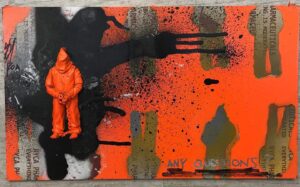Every day of the year — not just on the Day of the Imprisoned Writer — we must now ask ourselves why western governments would bother raising a major outcry about the countless writers, journalists and even poets serving prison terms in many countries, when they’ve done nothing to stop Israel’s murderous campaign against Palestinian and Lebanese journalists?*
As the keynote speech wrapped up in the grand banquet hall of a five-star hotel in San Diego, one of the organizers of the annual human rights conference peeked his head through the door. He gestured at me and a few other speakers, “Time for the action shot!”
I stepped out into the cool exterior and took my place among the rows of attendees — organization staff and activists from across the United States. We held signs bearing the names of political prisoners in the Middle East, each adorned with a flurry of hashtags. People set their faces into smiles, some struck jubilant poses, others thrust their fists dramatically into the air. As the camera flashed, once, twice, a disturbance stirred within me. The unease swelled amid the celebratory cheers and back-slapping as everyone migrated to the lobby for drinks.
This was my inaugural human rights conference experience in the United States in 2022. I’d been invited to share my experience as a six-year political prisoner in Egypt and to advocate for my friends who remained, and remain, incarcerated. In a space supposedly crafted for voices like mine, I couldn’t have felt more alien.
From the first planning meeting and throughout the conference, I’d gotten the distinct impression that my attempts to engage intellectually with my experience — whether during my panel or the round table discussions — were tolerated rather than sought; an indulgence they allowed me in order to get the more salacious gory details. The organizers seemed to say that they had others to philosophize on my behalf. My job was just to be paraded before the audience, to make sure they understood just how bad it is “over there.”
On the Day of the Imprisoned Writer, I am haunted even more intensely by what I experienced that day, now seen through the relentless year of genocide against my Palestinian kin in Gaza by the US-backed settler colonial project of Israel — a grim lens permanently etched onto my retina.
Established in 1981 by PEN International’s Writers in Prison Committee, the Day of the Imprisoned Writer is an annual international observance on November 15 dedicated to acknowledging and supporting writers who defend the fundamental human right to freedom of expression. It’s a noble mission, but I find myself questioning: What purpose do these commemorative days serve? Why does my gut churn every time I find myself in such spaces? More importantly, can the political incarceration of writers, journalists, and activists in our region ever end through such means? Or, to paraphrase Audre Lorde, can the master-approved campaigns ever dismantle the master-approved prisons?
The typical framing of these campaigns in the West emphasizes the local context of lawless Middle Eastern dictatorships and their victims. It places formerly incarcerated, dissident voices on a pedestal, forcing them into the position of native informants, there to showcase their scars and bruises in return for Western empathy. As the audience sheds tears and “connects,” these isolated moments of humanization must be quickly exploited by organizers. They circulate urgent appeals to remember those who remain incarcerated in those remote, uncivilized lands, in the hopes that the emotionally agitated audience might be moved enough to sign petitions or donate to support the organization’s critical work.
Does it yield any results? Sometimes. Mostly not. I’m not trying to be overly cynical or dismiss the importance of short-term relief efforts. Having once been confined behind the same bars where many dear friends remain, I understand the necessity of any work that might free even a single prisoner. I’ve signed the petitions myself, held up the protest signs, written the op-eds, circulated the appeals, spoken at the conferences and done the meetings. Yet, I’ve been unable to rid myself of the revulsion inside, or to see these measures as anything but ultimately futile in the long term.
So long as Egypt’s regime upholds European interests, Europe will not only ignore the abuse of the Egyptian people, they will even happily fund it.
To explain what I mean, I return to my firsthand experience with Egyptian political incarceration.
For a month and a half now, Laila Soueif — a 68-year-old Egyptian mathematics professor, political activist, and the mother of British-Egyptian blogger and activist Alaa Abdel Fattah — has been on a hunger strike. She shuttles between Cairo and London to advocate for her son’s release, but the UK’s unwillingness to work for Alaa Abdel Fattah’s freedom remains a profound disappointment to his family. David Lammy, who previously criticized government inaction and highlighted the leverage of the £4 billion trade deal with Egypt while a member of the opposition, has yet to publicly address Alaa’s case since assuming office as UK Foreign Secretary.
What does it mean for 60,000 Egyptian political prisoners when even the highest profile voice of Egypt’s revolution, imprisoned for over a decade since 2011, is reduced to a bargaining chip, readily ignored when it suits the UK’s political convenience?
The recent 7.4-billion-euro aid package from the European Union to the Egyptian regime further reminds us that the lives of political prisoners of the Middle East are traded like currency in the Western political bazaar. This support, meant to control migration and secure EU objectives, makes the underlying message clear: so long as Egypt’s regime upholds European interests, Europe will not only ignore the abuse of the Egyptian people, they will even happily fund it.
This brings us to the colossal parasitic alliance for whose sake our people are perceived as acceptable collateral: the United States, the Egyptian dictatorship, and the Israeli occupation.
Since the military coup in 2013, Egypt’s concessions on human rights under (reluctant) American pressure have been nothing but window dressing. Despite the United States’ significant leverage — Egypt’s regime being the third-largest recipient of US military aid in the world — the US prioritizes the safeguarding of its regional hegemony by keeping its lapdog happy (and therefore loyal).
Alaa Abd El-Fattah: Political Prisoner and Public Intellectual • Yasmine El Rashidi
As such, gestures on either side have been nothing but tokens, designed only to placate observers. In 2021, when the U.S. temporarily withheld $130 million in security aid due to concerns over political prisoners, Egypt responded with superficial reforms: launching a new human rights strategy, inaugurating a “five-star” prison complex design based on American standards, initiating a national dialogue, and reactivating a presidential pardon committee. However, as tensions escalated in Palestine in 2021 with the storming of Al-Aqsa and the subsequent bombings in Gaza, Egypt’s dictatorship stepped in to remind the world of its role as the region’s enforcer for Western interests. Soon, any talk of reforms or committees evaporated, and the plight of political prisoners was conveniently shelved.
When diaspora activists had succeeded in rebuilding momentum once more, October 7 arrived, and, once again, Egypt swiftly reminded the U.S. of the need for its strategic fidelity. The perennial quid pro quo was resumed: the US endorsed Egypt’s internal brutalization of its people in exchange for its continued subservience to the US-backed Israeli occupation and a see-nothing, hear-nothing, say-nothing policy toward their genocide in Gaza.
This is not a plea for American or European concern; rather, it’s a call to dispel any remaining illusions about those powers invested in our continued subjugation. The entities purporting to salvage bodies from the burning house stoke the fire with their other hand. To sustain the performance of rescue, the building must stay aflame. Certainly, it remains crucial to name and combat the arsonists operating from within our own homes, and to save as many bodies from the flames as possible. Yet it is also delusional to think that we can have any success in this struggle to put out the fire if we don’t begin considering the primary source of the inferno in the first place.
Europe and the US, with their violent colonial histories and continued exploitation of the Global South — coupled with their complicity in the ongoing genocide in Gaza — do not have the moral high ground required to even feign any ethical authority over human rights.
When considering the worth of observances like the Day of the Imprisoned Writer, we must grapple with the truth we’ve long known, one that the past year of genocide has unequivocally confirmed: Europe and the US, with their violent colonial histories and continued exploitation of the Global South — coupled with their complicity in the ongoing genocide in Gaza — do not have the moral high ground required to even feign any ethical authority over human rights. The chilling reality is that Egypt’s 60,000 political prisoners, and all political prisoners of the region, are nothing but footnotes to symbiotic relationships with local dictators.
This is in fact why so many human rights campaigns consistently avoid placing too much blame on the Western audience, opting instead for language and framing that instigates, at best, a gentle educational discomfort. When addressing the Western governments, they adopt a tone of moral appeal, a this-is-not-America rhetoric, which serves to actively obfuscate the fact that this is precisely what America stands for, invests in, and exports. It assumes the issue is a lack of awareness or misunderstanding on the part of policymakers. They just need to encounter the right case, hear one more story, witness a particular stream of tears, or see just the right photo of the prisoner sipping a Starbucks Mocha Frappuccino or picking out Ikea furniture two days before his arrest. Then, and only then, that proximity to Americanness might at last spark the long-awaited epiphany about the prisoner’s humanity and thus activate the policymaker’s inherent goodness, inciting them to do something to change the prisoner’s fate.
Occasions like the Day of the Imprisoned Writer will always degenerate into mere liberal spectacle meant for self-assuagement and grant reports write-ups, until they begin to confront the ways in which this world order is staunchly invested in the status quo. These observances and modes of organizing should not be glorified as an end goal but used as tools/avenues to mitigate the current situation while concurrently working to build alternative coalitions and spaces focused on changing out the rotten core of the world we inhabit.
We cannot carry the weight of the past year of genocide and not ask ourselves these questions nor engage in the critical work of imagining: How do we move beyond the symptoms of a malady to also target its roots as a core part of our organizing? How can we broaden the hyper-localized campaigns for political prisoners in distant lands to entail a rigorous examination of the West’s role in establishing these realities? How might US abolitionists grasp the inherent link between their internal battles and the dream of an Egypt, Syria, Jordan or Saudi Arabia free from political incarceration? What does it look like for such a day to name the massacred Palestinian poets, their assassins, and the financiers of the strikes that snuffed out their lights? What is it to be rooted in liberatory frameworks, not liberal ones? In the understanding that true liberation from political incarceration only comes with true liberation, period?
How do we, to borrow Fady Joudah’s words, transform a solidarity whose horizon is assimilation into one whose horizon is liberation? Move from the hierarchy that treats those it supports as abstractions to one that is citational, naming the ones it loves? How can we operate with the full awareness that Alaa Abdel Fattah, Ayman Moussa, Jamal Khashoggi, Walid Daqqa, Nasser Abu Srour, Mumia Abu-Jamal, Marcellus Khaliifah Williams, Shireen Abu Akleh and Narges Mohammadi are not flaws in the same interconnected system, but rather acceptable — no, essential — collateral damage meant to guarantee its continuation?
* As of November 13, 2024, investigations by the Committee for the Protection of Journalists showed at least 137 journalists and media workers were among the more than tens of thousands killed in Gaza, the West Bank, Israel, and Lebanon since the war began, making it the deadliest period for journalists since CPJ began gathering data in 1992. Indeed, more have been killed in 2023-2024 than in World War II and the Vietnam War combined.



